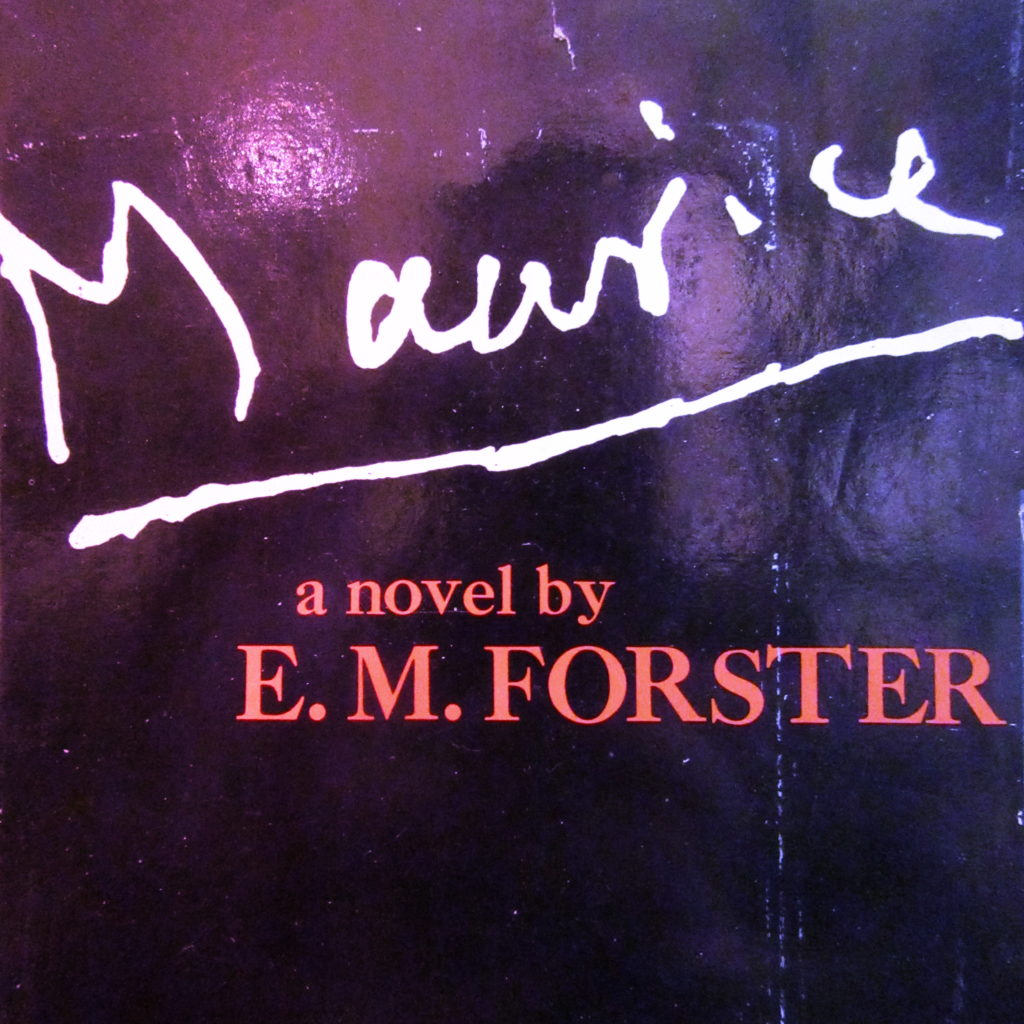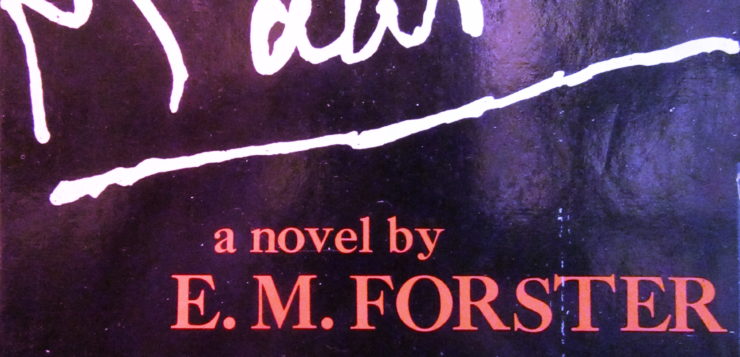
Of the handful of books that informed my adolescent understanding of what it meant to be gay, E. M. Forster’s posthumously published Maurice was the most revelatory. The reasons are numerous, but the most important was that it held out hope to a confused young mind—mine—enduring a very dark night of the soul.
By the time I encountered the book, I had felt suicidal urges for several years. The cause: my loneliness and confusion at being queer. In a million ways, the world said I was bad or evil. Worse—at least to my way of thinking—I was convinced I would never know love.
At seventeen I contemplated overturning the family car while driving, leaving unanswered the question of whether I had died accidentally. I didn’t do it because I couldn’t be sure of complete success and was terrified of living in a state of reduced physical and mental competence. At eighteen, while studying at Dalhousie University, I went down to Halifax’s waterfront several nights in a row to try to induce myself to walk into the water and drown. The problem here was that I was a good swimmer and I knew I would put up a fight. I hadn’t yet heard of Virginia Woolf’s trick of weighting her pockets with stones.
I did, however, have an epiphany that held out hope.
Like Forster’s hero, Maurice Hall, I wondered what it would be like simply not to exist. In a dark moment, Maurice reflects on Sophocles’ pronouncement in Oedipus at Colonus: “Not to be born is best.” I understood that feeling. One night, as I stood on the shore and thought about what it would be like not to exist, I heard in my head the very same words that would spawn a social movement for gay youth three decades later: “It gets better.” Where they came from to this day I do not know, but I held on because of that slenderest of promises.
And it did get better. It was not long afterward that I discovered Forster’s final gift to the world, published in 1971 following his death at the age of 91. I had already read Howards End in an English literature class. That and Woolf’s Mrs Dalloway were my favorite takeaways from the course, though I was then only marginally aware of their authors’ sexuality and personal struggles.
Until that time, I hadn’t encountered much literature dealing with homosexuality in any form apart from the platonic, which did not interest me, a sexually overwrought teenager who had already begun to experience anonymous physical encounters.
We all knew about Tennessee Williams, but the issue seemed obscured in plays like Cat on a Hot Tin Roof, especially the film version, which did everything to avoid naming the play’s central theme. Similarly, with Jack Kerouac and his “friend” Neil Cassady: I detected something relevant there, but could not find it made explicit in any of the books the relationship engendered. Even Oscar Wilde’s The Picture of Dorian Gray hinted at far more than it openly admitted. I was looking for definitive answers, not clues to things left unstated.
Until Maurice, the only overtly gay literature I had read were Jean Genet’s novels Our Lady of the Flowers and The Miracle of the Rose. Gay, certainly, and impressively literary—but neither optimistic nor hopeful. Thus I preferred the prospect of death.
Maurice, then, was revelatory. It said without ambiguity that at some time in the recent past another man had confronted the same questions and tackled the same issues I was facing. Whether Forster’s conclusions were right or wrong didn’t matter—I’d found a kindred spirit. Or, as Maurice puts it toward the end of the novel on discovering his love for the gamekeeper Alec Scudder, “They intended no harm to the world, but … they must show that when two are gathered together majorities shall not triumph.” That passage could have served as the credo for an early gay liberation movement.
Forster has been criticized for not publishing the novel in his lifetime, some claiming it would have opened eyes and possibly saved lives. The reason for his decision not to publish is obvious: his generation had lived through Wilde’s scandal after he was outed as gay, a crime at the time, and Forster was wary of the fallout. Later, however, he came to question the novel’s literary value. “Publishable, but worth it?” was one of his last pronouncements on the manuscript, revised for a final time in 1960. However we view his decision now, fortunately he did not, as others might have done, destroy his work and forever obscure his thoughts on the matter.
Apart from the dated social mores around class and sex, Maurice’s problems sound surprisingly contemporary as he struggles with loneliness, self-hatred, and the judgments of others. He turns to a friend, Clive, who suffers from the same “affliction.” Clive at first embraces, then rejects him, precipitating Maurice’s emotional crisis. Maurice next turns to a doctor who flatly refutes his self-diagnosis with a verdict of, “Rubbish … you whom I see and know to be a decent fellow!”
Desperate for a cure, Maurice finally approaches a hypnotist. Here, at least, he finds some semblance of empathy. Or, as his therapist puts it, “England has ever been disinclined to accept human nature.” Ultimately failing to “cure” him, Maurice is told his best bet may be moving to a country where such feelings are accepted.
What changes Maurice, of course, is self-acceptance.
With this book, Forster seems to have been writing a rationale to justify his path to self-liberation while facing his own dark nights of the soul. At the same time, Maurice manages to be a compelling and sensitive love story, one full of hope and possibility for the reclamation of one’s soul and, indeed, one’s life.
Unlike the saint-like Margaret Schlegel of Howards End, who accepts and tolerates all with her “only connect” rationale, Maurice ultimately rejects every trace of social conditioning, tradition, and dogma represented by religion, politics, family, and social mores. It’s a matter of survival. Maurice’s hero recognizes that he “must live outside class, without relations or money,” unlike the “timorous millions [who] own stuffy little boxes, but never their own souls.”
Conformity, Forster realizes, is the true “perversion” because it is unnatural for both body and soul. Having finally rejected suicide as an option, he concludes that it is better to live and be wrong than never to live at all. For this, Maurice is nothing less than a story about the liberation of the human spirit.
 Jeffrey Round is an award-winning author, director and song writer. His latest book is Lion’s Head Revisited, seventh in the Lambda-winning Dan Sharp mystery series.
Jeffrey Round is an award-winning author, director and song writer. His latest book is Lion’s Head Revisited, seventh in the Lambda-winning Dan Sharp mystery series.






